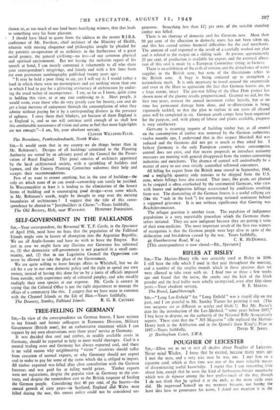TREE-FELLING IN GERMANY
Sta,—In view of the correspondence on German forests, I have written to my friends and former colleagues in Economic Division, Military Government (British zone), for an authoritative statement which I can support by my own observations over three years' service in Germany.
It was decided that coal and timber, as readily available assets in Germany, should be exported to help to meet world shortages. Coal is a normal trading asset and Germany has always exported coal, and there is no valid reason why neighbouring "victor" countries should suffer from cessation of normal exports, or why Germany should not export coal in order to pay for some of the items which she is obliged to import. All timber exported was felled after close consultation with the German foresters and was paid for at ruling world prices. Timber exports were not reparations, despite the popular view in Germany to the con- trary, and despite the tremendous cost to the British taxpayer of feeding the German people. Considering that 40 per cent, of the forests—the annual growth of sixty years—in Scotland, England and Wales were felled during the war, this export policy could not be considered un- generous. Something less than 12i per cent, of the suitable standing timber was felled.
There is no shortage of domestic coal for Germans now. More than 50 per cent of the allocation to domestic users has not been taken up, and this has caused serious financial difficulties for the coal merchants. The amount of coal exported is the result of a carefully worked out plan and is related to the eotput on a sliding scale. At present approximately 20 per cent, of production is available for export, and the eventual alloca- tion of this coal is made by a European Committee sitting in Geneva.
There is an exhibition of the evils of erosion and the disturbance of water supplies in the British zone, but none of the illustrations refers to the British zone. A bogy is being conjured up to strengthen a nationalistic myth. It is only necessary to travel around the countryside and even in the Harz to appreciate the fact that German forests are, to a large extent, intact The pre-war felling of die Oker Dam project has shown none of the gloomy results prognosticated. Granted we did, for the first two steals, overcut the annual increment rather heavily, but at no time has permanent damage been done, and re-afforestation is being vigorously tackled, so that the plan to replant in ten years all cleared areas will be completed in six. German youth camps have been organised for the purpose, and, with plenty of labour and plants available, progress is very satisfactory.
Germany is resuming imports of building timber but, as all control on the consumption of timber was removed by the German authorities
• twelve months ago, I understand that in this respect Marshall Aid was reduced and the Germans did not get 35 much as they asked for. I believe Germany is the only European country where consumption control does not exist, and that recent proposals to introduce economy measures are meeting with general disapproval from the timber-consuming industries and merchants. The absence of control will undoubtedly be a matter of envy to our own strictly controlled softwood consumers.
All felling for export from the British zone ceased in September, 1948, and a negligible quantity only remains to be shipped from the U.S. zone, where fellings have also ceased. That trees, like grain, arc planted to be cropped is often overlooked by the sentimental Germans, who view with horror and indignation fellings nxessitated by cotiditions resulting from war. The dismantling of the German forests is a useful rallying cry (like the "stab in the back ") for mustering national sentiment behind a supposed grievance. It is not without significance that Goering was Reichsforstmeister.
The refugee question is another issue. The expulsion of indigenous populations is a very regrettable procedure which the Germans them- selves initiated. They are now indignant because they are getting 'a taste of their own medicine. The most important result of the first two winters of occupation is that the German people were kept alive in spite of the dislocation and breakdown caused by the war. Yours faithfully,






























 Previous page
Previous page